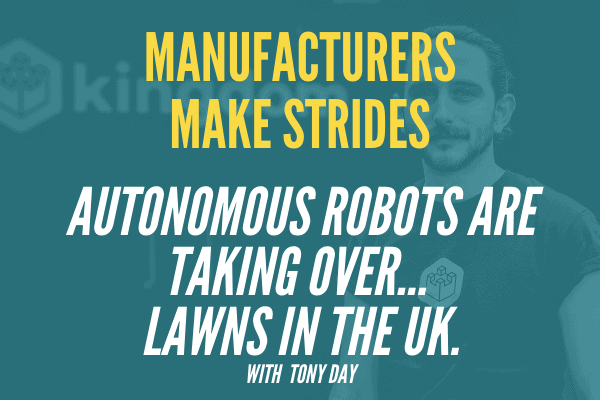Have you ever wondered what it would be like to have your very own autonomous robot doing chores for you? You don’t have to wonder anymore. Autonomous robots are becoming increasingly popular in the UK – and one of the most prevalent is the new autonomous robotic lawnmowers that are being developed by Kingdom Technologies.
I chatted to Tony Day, the head of mechanical engineering at Kingdom Technologies, to pick his brain about planning, designing, and prototyping the revolutionary automatic robotic lawnmowers that are being used by city councils, universities, and golf clubs across the country.
While you might not be seeing a Kingdom Tech lawnmower in your neighbourhood any time soon, be sure to keep an eye out for them on the sprawling lawns of your nearest golf club or university.
Watch the video and read our blog to find out more about what these robots are up to!
How did you get involved in engineering?
My experience when I was younger was with my dad, getting involved with repairing the car or fixing something around the house, that kind of stuff.
I bought an old Land Rover and took everything off, seeing how it worked, then putting it back together again. Sometimes it worked again and sometimes it didn’t! You have to kind of go through that. So, I think that’s where it all kind of stemmed from.
You’re creating autonomous robots with Kingdom technology, what do these robots do?
So, robot lawnmowers – nothing new there, they’ve been around for a few years now. The ones that you typically find, are for homeowners. They cut small lawns. The idea is that you install a boundary cable around the edge of the lawn and that’s how it knows where to cut. So, the robot goes out and as soon as it senses the cable it knows that’s the edge and it turns and drives off. But it doesn’t do it in any particular order, it just randomly moves around.
Our product is designed for larger landscapes. One of the ways that we do this is by navigating more intelligently. So, the robot plans a path around the lawn so that it covers only each part of the lawn once as it goes over. Also, it doesn’t need a boundary cable. We’ve got rid of that by using proprietary, extremely accurate positioning technology, along with novel mapping and path planning algorithms. We have an app where you can draw the boundary of grass you want to cut, then make dynamic changes if you want on the fly. So we’re using our robot to do large areas, we’re targeting B to B going to commercial customers.
What’s your process for developing and manufacturing your autonomous robots?
We’ve been using a slightly different technique to what I would call traditional manufacturing and development. You’d have a prototype and do lots of tests in isolation. and build it up. Once that’s at a point where you’re happy with it, you’ll move on to a form of series production.
What we tend to do is create a design change from the original robot. You can compare it to a prototype, but it’s not the final product. It’s just a first attempt that we then iterate through and make changes to. Then we’ll put them out into the field and send them to the customers to get feedback. After that, we make the changes quite quickly. The idea is that there shouldn’t be huge changes to make. They should be small, incremental changes – just optimising the original design.
What are the goals of Kingdom technologies over the next few years?
We’ve planned out over the next 18 months to get to the series A point, where we can start to produce the robot as and when we need it.
The idea is to get this design of robot up to Series A. Then it’s a case of all the designs are frozen and we can order as many as we want on a month by month basis. So there’s a lot to do. We need to do a lot of work purely on how the robot functions and how it handles the day to day tasks. Also, making sure we get everything through the compliance and it’s signed off against all the correct safety standards.
We will also be making sure that our manufacturing partners are capable of handling the volumes we’re talking about. Currently, we’re talking about double-digit numbers, whereas soon we’ll be into the hundreds, and even more every year.
Contact Tony here.




